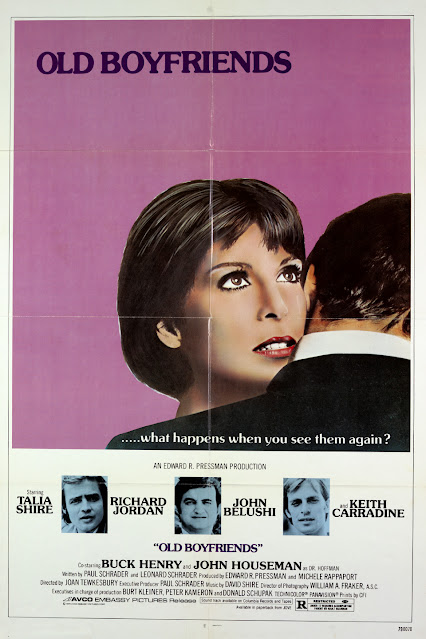Old Boyfriends
I've seen movies where a frustrated soul decides to take stock of their dissatisfying current life by revisiting the past. Sometimes, they seek out former friends and/or lovers to discern patterns about themselves. Perhaps understand why they are so messed up, to put it politely. Movies like HIGH FIDELITY and BROKEN FLOWERS. 1979's OLD BOYFRIENDS is another, but this one is somewhat odd. Oddball, you might say. It's a film where the tone is never quite certain, further muddied by David Shire's dynamic scoring. Sometimes it is dissonant, almost suited for a horror film. Other times it resembles Hollywood schmaltz. The scenes to which it is set run a gamut themselves. Most moments seem to be serious, a few just outright comedic, and out of step.
Talia Shire, in one of her rare leading roles, plays a psychiatrist named Dianne Cruise. We gradually learn about her as the film progresses. Her marriage failed, as did a suicide attempt. She drives from L.A. on a quest to reunite with three boyfriends, each of whom were pivotal during her days as a student. She works backwards - college beau she almost married named Jeff (Richard Jordan), high school oaf named Eric (John Belushi) who crudely tried to get her to go all the way, and junior high crush, who she discovers had died several years earlier. Jeff is a director stuck doing commercials in Colorado. Eric owns a clothing store. Wayne (Keith Carradine), the younger brother of the junior high bf, still lives with his mother.
Each journey plays quite differently. Jeff is taken aback by Dianne's reemergence but is quite open to rekindling. Their early scenes suggest a healthy new beginning for Dianne, but about the time she bonds with Jeff's teenage daughter, she splits, bound for Minneapolis, her hometown. Is she afraid? Or just on a cold mission, a clinical assignment? When she meets Eric, who still plays in a band after hours, her methods become clearer. The third act of OLD BOYFRIENDS removes any viewer doubt, and for me was quite disturbing.
Director Joan Tewkesbury molds an utterly fascinating but often highly frustrating motion picture. So many ideas that just don't flow together. Abrupt, with abrupt editing by William H. Reynolds that actually cuts away while characters are still speaking! Emblematic, in a fashion. I'm not sure how much of Paul and Leonard Schrader's script (which commendably takes several unexpected turns) she retooled, as the feminist insight is uncommonly strong. Or maybe the Schraders were just very in touch with their feminine sides. Either way, the movie is a firmly a fractured case study of a highly troubled individual who happens to be a woman. The psychology is fairly deep in moments, with a fine point exclaimed in a cameo by John Houseman as another psychiatrist. His dress down of Dianne will strike you as either exemplary acting or pure ham fat.
Shire's performance is not strong. Often, she doesn't seem up to the part, yet strangely she always seems right, credible. Odd, like everything else. Like that hilarious scene with Buck Henry as a private investigator. Or some of the broader comedic moments with Belushi, who obviously sobered up from his well publicized addictions for this role and is quite good. He even gets to perform "Jailhouse Rock" a year before he did it again with Dan Aykroyd in THE BLUES BROTHERS. Look carefully at the other band members, too. The supporting cast are all fine, with a special mention for Jordan. All concerned deserved a more focused movie, but I was fairly mesmerized by it a lot of the time.
P.S. - The late '70s vibe also really carried this movie for me. Look at those shelves - I had the exact ones in my childhood bedroom! And Jeff peers out a window to see STAR WARS playing at Grauman's Chinese Theater! I love this sort of minitiae.




Comments